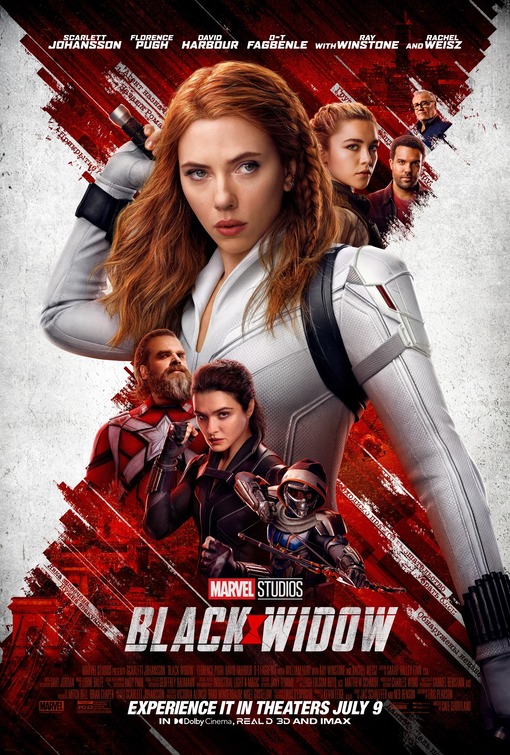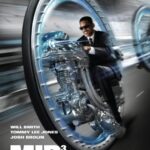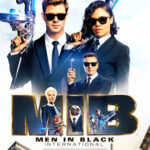
Director
Cate Shortland
Starring
Scarlett Johansson
Florence Pugh
Rachel Weisz
David Harbour
Taking place immediately after the events in Civil War, Natasha Romanoff [Johansson] is on the run, hiding out in a remote part of Norway. There she receives a package that draws her back into her old life as a spy, before joining SHIELD and becoming an Avenger. Racing across Europe, she is reunited with the members of her childhood mission that made up her family (albeit a constructed cover story) and discovers that the Red Room that trained her is still active and chemically controlling the minds of their current members.
Helmed by Shortland, Black Widow is one of the least Marvel feeling movies in the current roster. It hits all the beats and is clearly part of the shared universe but the presentation of the first two thirds stands separate to the degree that this could easily be a disconnected action thriller. For some this will be a negative while for others it will be the perfect palate cleanser. Leaning heavily on it’s contemporaries, Black Widow heavily presents itself as an equal to the modern spy thriller, evoking Mission: Impossible energy with elaborate stunts and action beats across locales then cooling off with quiet moments in rustic locations stocked with guns to assess exactly what went wrong. On top of that, the film goes out of its way to make direct James Bond parallels with Natasha reciting old Roger Moore films in her spare time. For me, this was an incredibly smart move, it not only positions this release as an alternative counterpart but doubles down on the suspension of disbelief; the idea that if we are willing to accept that this spy can fight alien hordes and out-of-control AI robots, she can survive a fall that someone like James Bond or Ethan Hunt would be able to endure.
As much as the comic-book element is present with the continuation of the cold war legacy of mind control, manipulation and brainwashing, the film is largely presented as a straight thriller. The cinematography tilts more toward a grounded political cryptogram with a heavy chase element, while the direction is close and tight and continuing that sort of Jason Bourne kineticism. That is, all the way until the third act which sort of suffers from the same issues that plagued Wonder Woman – with the established setting and logic heavily abandoned for an obligatory CGI spectacle piece. Thankfully, this transition isn’t nearly as unpleasant as it could be, thanks to the unsurprisingly impressive score from Lorne Balfe which carries us through with great recurring leitmotifs and momentum. I would even go so far as to say that it stands alongside The Winter Soldier, Doctor Strange and Black Panther as one of the best all-round Marvel scores. Although it has to be said, studios teasing us with these bold trailer themes that are in no way present in the final score is an unfortunate industry necessity but make for a very frustrating time when they hit a really decent sound that is nowhere to be seen in the finished film. Looking at you Captain Marvel.
On an acting front, I was overall very pleased. The dynamic and chemistry between Pugh and Johansson as Natasha and Yelena is fantastic with Pugh’s chaotic younger sister vibes ensure she’s not just Black Widow 2.0 – even though that’s the very definition of what the studio is doing here. There’s also just enough self aware commentary that lambasts how Johansson’s character has been handled in previous instalments; things like mocking the way Romanoff performs a “superhero landing” then flicking her hair back, with Yelena accusing her of being “such a poser.” Some may believe the back and forth juxtaposition between the irreverence and severity of the situation invalidates its presence in the first place while others will see it as gallows humour in the vein of most standard marvel quipping in the face of certain death. I feel it’s probably a bit of both. Any time we feel we’re getting close to some actual deep-felt development, we are pulled back with an undercut of comedy – something that has been present in these movies since the beginning and very much a product of the Whedon-style TV writing of the late 90s. At one point Yelena ribs Natasha for her idea of moving on, highlighting that they are both serial murderers but only one of them is on magazines with little girls around the world calling her a hero. It’s a very interesting point that is never fully addressed. There is the idea that redemption is a thing but not really fleshed out enough for us to say whether it is ever truly earned, either by the titular character or anyone else in the Red Room programme. The irony here is that with Marvel’s plan, Yelena will have the exact same hollow transition that she chides Natasha for reaches for.
The film is also carried by decent supporting roles. The dysfunctional family element is one of the film’s strongest components when it is firing on all cylinders. Harbour and Weisz play the Incredibles roles of the big dumb but caring strong dad and the clever mum who’s under appreciated and “doing this for your own good.” I will admit that with the film pressing heavily on the who can you trust angle, the development of these characters can feel a little up and down and there’s an odd conceit that while undercover these individuals have the perfect American accents but for the point of the movie they adopt Russian accents for the rest of the film. Then we have the central villain, who I won’t get too deep into to avoid spoilers but I find it hard to separate the actor from the performance for this one. The role in question is played by Ray Winstone and what he does with the script is perfectly serviceable but I cannot fathom why he was chosen. Of the central cast, he is the third British actor playing a Russian and while he has the requisite menace, I feel this could have been done by anyone and for such a strong part of Natasha’s life and drive, he will eventually be remarkably forgettable.
My main complaint with this film is that it didn’t have any surprises for me. So much of this feature is competently executed and thoroughly enjoyable but ultimately nothing I didn’t see coming. And I think a lot of that stems from the delay to tell this story. As stated from the outset of this review, the events portrayed take place just after Civil War and that would likely have been the best time to release this film. More so than that, this is a long overdue outing considering Johansson has been in the on-screen MCU longer than Captain America or Thor. This is frankly a movie that you could have put out around the time of Iron Man 3 (2013 for those who have forgotten) and it would have stood out as one of the best. Instead what we get is a solid send off but also a frustrating glimpse of an entire trilogy that could have served as one of the MCU’s most interesting properties.
I also mentioned earlier that this movie feels like it’s trying to say something but whenever it gets too close to something of note, an overbearing censor swoops in and says “that’s far too serious, we need to add some levity here.” The themes of child abuse and trafficking are incredibly serious and the movie alludes to it in a way that feels like it scratches the surface. There’s a magnificently cold line which is that the one resource that is an abundance which can be easily exploited is girls. That is frankly chilling in how poignant it is yet being an escapist film, the movie never pushes hard enough on that to feel like it has taken any real stand.
Ultimately, at no point did I believe this story was being told because it needed to be, it feels more like filling a quota or meeting a contractual obligation. That being said, I think it is a strong standalone expansion which introduces us to a brilliant new player as well as a fitting tribute to a familiar one in this multi-billion dollar sandbox. But the truth is, as I have said time and again, Marvel films are structured like TV episodes now; they all feed into a larger narrative arc with big mythology episodes pushing the stories forward and smaller monster-of-the-week adventures that add to the whole but can be seen as self-contained tales. Black Widow has the unfortunate nature of being an early season standalone episode but was only bundled with a DVD release of the series; so it fills in a lot of blanks but if you missed it, you haven’t necessarily missed out. And for me, that’s a damn shame.
Release Date:
09 July 2021
The Scene To Look Out For:
I will say that Black Widow, arguably has one of the most engrossing cold opens in any Marvel film. Set in the mid 90s it quickly establishes the faux-harmony of the undercover spy family with a deep level of genuine affection shared among them. This is all heightened by the daring escape to Cuba under hot-pursuit from the law. Executed compellingly, maintaining a sense of urgency and threat, it pulls you right in. It’s a shame that we don’t really hit that high again for a long time but it’s a hell of a way to start a film.
Notable Characters:
We have to talk about Taskmaster. For the longest time Marvel has had a problem with its villains, with the best efforts either being turned into antiheroes (Loki and Zemo) or killing them off entirely (Killmonger and Thanos). For fans of the named character, this will likely feel like a sort of betrayal, for others it will merely be the start of a potentially long narrative journey. But while this remains to be seen, I felt the identity, role and motivation of Taskmaster became a sort of race against the clock. To explain, this movie has a full opening titles sequence with the top-billed actors named upfront. This meant that I gleaned a name which had yet to be seen or confirmed, so it was impossible not to start formulating theories based primarily on that actor as opposed to anything being teased on-screen.
Highlighted Quote:
“This would be a cool way to die”
In A Few Words:
“A gratifying eleventh-hour release that would have had significantly more impact if it were released when first demanded some eight years ago”
Total Score: 4/5

![The Red Right Hand Movie Reviews [Matthew Stogdon]](https://reviews.theredrighthand.co.uk/wp-content/uploads/2021/12/cropped-header1.png)


